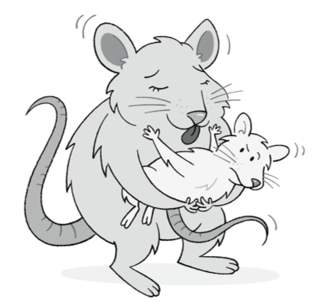
Stress
The Epigenetics of Childhood Trauma
Part 2: How childhood adversity can provoke serious long-term consequences.
Posted September 20, 2019 Reviewed by Jessica Schrader
This is the second of two posts regarding the epigenetics of childhood adversity, which is based on excerpts from my new book, This Is Depression. Just like cigarette toxins can cause cancer, there is growing evidence that serious stressors, especially early in life, can alter gene expression and provoke physical and mental illness later in life.
Most of the scientific research conducted to understand the power of early life adversity has been done with rats. Because human babies are not appropriate study subjects, since they should never be exposed to serious stress, we are still at the stage of drawing inferences from rat and other animal studies, but the massive quantity of research in this area is building confidence about the findings and their applicability to human beings.
Parenting of human babies can be performed by loving, nurturing caregivers of either sex. However, rat dads are generally deadbeats, while rat moms tend to be the caring nurturers, thus most adversity studies are conducted on rat moms and their pups. Researchers create rat models of stress, exposing rat moms to stressful environments that simulate the stress a human parent might experience, and then assess the impact on their offspring.
Rat moms who are loving and nurturing will lick their pups a great deal, thus they are called “high lickers.” This is a stable trait, meaning that the pups of high-licking moms usually become high-licking parents themselves. Licking is not just a feel-good experience for the mom and her babies—it provokes critical development. The size, strength, intelligence, reproductive capabilities, and physical and mental health of the pups are strongly influenced by the amount of licking. Every rat pup wants a mom who is a “high licker.”

On top of these developmental benefits, a rat mom’s licking appears to provoke epigenetic changes in genes that can help pups manage stress. The most important stress hormone for mammals is called cortisol, and the level of cortisol in our bodies is regulated by glucocorticoid receptors. The gene for the glucocorticoid receptor is highly influenced by maternal care. Highly licked rat pups have lots of glucocorticoid receptors, so they can manage their body’s stress response rapidly and get back to normal quickly.
Pups from low-licking moms have fewer glucocorticoid receptors, resulting in a less effective response to stressful events. Their response to stress tends to be greatly exaggerated and it takes them much longer to recover and feel calm and safe again.
The heritability of the licking trait is so important because it suggests that the epigenetic changes related to loving and nurturing parenting can be passed down to our children, helping them to be loving and nurturing parents themselves. Unfortunately, the inverse is also true: growing up in an abusive, chaotic, or non-nurturing environment can provoke changes to a child’s genome that can be passed on to their offspring, heightening the risk of generational abuse, neglect, and family chaos.
There is some good news: rat pups from low-licking moms can be adopted by high-licking moms, and the pup’s stress response can be normalized. However, what we don’t know is how long a pup can be exposed to a stressful environment before the harmful epigenetic changes become irreversible. Low-licking rat moms don’t suddenly become high-licking rat moms, perhaps because they don’t have access to high-quality psychotherapy. Fortunately, most human parents have a great ability to change, if that is their wish, especially if they have access to a supportive environment.
Other research has demonstrated the long-term impact of a stressful childhood on cognitive functioning, such as memory, concentration, and executive functioning, which includes organizing, planning, forward-thinking, and critical thinking. When researchers limited mother rat’s nesting material, thereby provoking stress, their maternal behavior became more fragmented and less loving and nurturing. The moms would also lick their pups less, resulting in emotional and physical deprivation. The longer the mom was influenced by stress, the more anhedonic the pups became, no longer enjoying activities that are usually fun for rat pups.
When the researchers assessed the adolescent pups of stressed-out moms, the pups seemed to have normal cognitive functioning. Once they reached middle age, however, the rats that experienced maternal deprivation began to show cognitive deficits that were more significant than expected for their age. This implies that their brain functions were prematurely declining and was consistent with what would be expected from a much older rat. More concerning, when researchers then tested the cognitive functioning of the adolescent pups exposed to stressful situations, cognitive decline was already apparent.
Research has also demonstrated that there are not just emotional implications, such as depression and anxiety, resulting from severe childhood adversity. Children who are exposed to abuse (physical, sexual, emotional, including unrelenting bullying or racism), the loss of a close loved one, a life-threatening illness, poverty, or a nasty divorce, are at risk for physical illnesses as well, including heart disease, obesity, diabetes, and other inflammatory illnesses.
Physical, sexual, and emotional abuse is tremendously harmful to developing brains and bodies. Neglect, chaos, and unpredictable, fragmented parenting can also result in enduring harm and impairment.
The epigenetic changes these stressful exposures provoke might also be heritable. This means that children who have been harmed by a stressful childhood, resulting in epigenetic changes to their genome, can pass those genetic alterations down to their offspring. As a result, their children might also have an abnormal, excessive stress response and a heightened risk of mental and physical illnesses.
If something that was highly distressing, traumatic, and unfair happened to you as a child, that does not define you. Many people have crappy childhoods, enduring abuse, neglect, chaos, and loss, and become happy, fulfilled, generous, loving people. They also become great parents, partners, siblings, and members of the community.
No one chooses to be burdened with trauma as a child. One of the reasons traumatic experiences can have such a great impact on children is because they have so little control over what happens to them. However, as adults, we do have control. In fact, the only person on earth we can control is ourselves. As adults, we must protect the children in our lives, and strive to create a society that is safe, loving, and nurturing for every child.
References
Danese, A., Moffitt, T.E., et al. (2009) “Adverse childhood experiences and adult risk factors for age-related disease: depression, inflammation, and clustering of metabolic risk markers.” Arch Pediatr Adolesc Med. 163 12: 1135–43.
Lucassen, P.J., Oomen, C.A., et al. (2015) “Regulation of adult neurogenesis and plasticity by (early) stress, glucocorticoids, and inflammation.” Cold Spring Harb Perspect Biol. 7 9: a021303.
Lucassen, P.J., Naninck, E.F., et al. (2013) “Perinatal programming of adult hippocampal structure and function; emerging roles of stress, nutrition and epigenetics.” Trends Neurosci. 36 11: 621–31.
Lucassen, P.J., Pruessner, J., et al. (2014) “Neuropathology of stress.” Acta Neuropathol. 127 1: 109–35.
Molet, J., Maras, P.M., Avishai-Eliner, S., Baram, T.Z. (2014) “Naturalistic rodent models of chronic early-life stress.” Dev Psychobiol. 127 1: 1675–88.
Naninck, E.F., Hoeijmakers, L., et al. (2015) “Chronic early life stress alters developmental and adult neurogenesis and impairs cognitive function in mice.” Hippocampus 25 3: 309–28.
Pan, P., Fleming, A.S., Lawson, D., et a. (2014). “Within- and between-litter maternal care alter behavior and gene regulation in female offspring.” Behav Neurosci 128 6: 736–48.
Singh-Taylor, A., Korosi, A., Molet, J., et al. (2014) “Synaptic rewiring of stress-sensitive neurons by early-life experience: a mechanism for resilience?” Neurobiology of stress 1: 109–115.
Yam, K.Y., Naninck, E.F., Schmidt, M.V., et al. (2015) “Early-life adversity programs emotional functions and the neuroendocrine stress system: the contribution of nutrition, metabolic hormones and epigenetic mechanisms.” Stress 18 3: 328–42.



